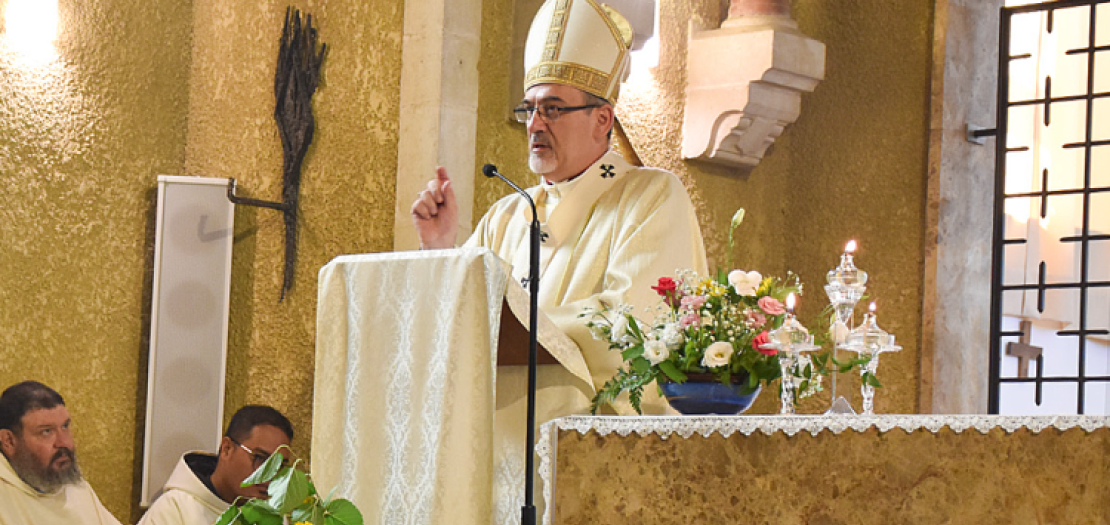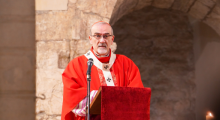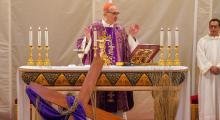Issued by the Catholic Center for Studies and Media - Jordan. Editor-in-chief Fr. Rif'at Bader - موقع أبونا abouna.org

Following is the text of His Beatitude Cardinal Pierbattista Pizzaballa’s homily at Poor Clare Monastery, marking the Feast of St. Clare, dated August 11, 2025:
Dear brothers and sisters,
dear poor Sisters of St. Clare,
may the Lord grant you peace!
I would like to begin my short meditation today on the Solemnity of St. Clare with a passage from the second reading, which is taken from the second letter to the Corinthians.
God is light. And primitive man was created and clothed in light. And this light shone in the heart of man. But our heart is like earthen vessels. It breaks easily. And so it was when Adam sinned and disobeyed God’s commandment. But Christ has clothed us with light again, has restored in us the original fellowship with God. Contemplating His face, we behold God’s glory, we experience redemption, communion. Of course, we remain earthen vessels. But our limitations and sinfulness are no longer a condemnation. On the contrary, God’s strength and greatness are revealed in our weakness and sinfulness. Precisely because we are “earthen vessels”, small and sinful, it is clearly shown that “this surpassing power may be of God and not from us.” (2 Cor 4:7)
But what greatness is the Apostle talking about? There is nothing great; we see no “extraordinary power” in the Christian life. On the contrary, then as now, when it is authentic, the Christian life is characterized by an element of meekness, of smallness. The style of the Beatitudes of the Gospel is what characterizes the Christian life. And there is nothing grand and powerful in the Beatitudes. Christian logic is very different from the worldly logic of power and strength. In today’s passage, the Apostle himself speaks of tribulation and persecution, of an earthly life that is wasting away. He alludes to visible things, to the power of worldly logic, which, however, has no temporal permanence, and he calls us to contemplate that which remains forever, but which is invisible to the human eye. It is not something great and extraordinary by human standards that we can possess and control.
If, although we are “earthen vessels”, we respect human life and dignity by the way we live, if we are loving, forgiving and being close to others; if we are able to have compassion, that is, to bend over the wounds of those around us in order to pour the balm of God’s mercy on them, then the light with which Christ has clothed us once again, the “extraordinary power of God”, will be revealed to the world. In this way we make the true face of God known. The “extraordinary power” of which the Apostle speaks is therefore the power of life, of love, of forgiveness, of the desire for good and of compassion. The world will not love and understand us and will do everything it can to extinguish the divine light within us. But we need not fear. We are not discouraged. As the apostle says: “We are afflicted in every way, but not constrained; perplexed, but not driven to despair; persecuted, but not abandoned; struck down, but not destroyed; always carrying about in the body the dying of Jesus, so that the life of Jesus may also be manifested in our body.” (2 Cor 4:8-10)
St. Clare of Assisi, the seedling of Francis, embodied this mystery. In a context of affliction and political uncertainty, domination and violence, poverty and insecurity, she was able to resist the insistence of those who wanted to protect her from dangers and give her economic security. She insisted on saying: only Christ, only the Gospel, we don’t need anything else. We don’t need human guarantees. Paraphrasing today’s passage from the Apostle, it’s as if she’s saying, “Let us not look at the visible, earthly, fallen things, but at the invisible, eternal things. We want to behold the face of Christ, to be clothed in His light and nothing else.” And in doing so, she truly revealed the face of God to the world. She had certainly not been spared labors and pain. From then until today, in silence, in contemplation, in confident giving, in constant prayer for the Church and the world, Clare of Assisi still reminds the Church and the world of the need to look to invisible and eternal things and not to fall back on purely earthly considerations.
We also need this today, here in the Holy Land. We tend to contemplate only our pain, our suffering and the injustices that hurt us, and we are no longer able to think about anything else. We can no longer see the people around us, and perhaps we cannot even see the face of God in this way. The heart is so full of pain that it is no longer able to think about anything other than itself. And we are good at justifying this inability, because our wounds are incredibly serious and deep. But all this, as humanly understandable as it may be, cannot stop our love for our neighbor and cannot be the source of our omissions. For a Christian, it is never the others who reject us, but it is we who dare not challenge them in the love that Christ has poured into our hearts.
A love in which we should always remain, as the Gospel reminds us. It is what sustains us, like the branch on the vine. “Remain” is the key word in the Gospel we have heard. The image Jesus uses is that of the vine and the branches, and it is a powerful image: We are grafted into the life of the Trinity as a branch is grafted into the vine. Just as a single sap, a single life flows between the vine and the branch, so a single sap, a single life circulates between God and us. “Remaining,” in this context therefore means living. And, if we do not remain in this circle of life, if we detach ourselves, then the result can only be death. We may appear to be alive, like the branch that lives on for a while without the sap, but in reality, it is dead, and soon it dries up and is thrown away because it is no longer of any use.
Religious life is nothing other than this: to make the relationship with Jesus the center of one’s life, an exclusive relationship, and to remain in it. In the society and the Church at the time of Francis and Clare of Assisi, as well as in the society and the Church of our time, religious life has this mission to bear witness to: one can only live according to the Gospel, one can choose to remain in the exclusive relationship with Christ and be happy. An exclusive relationship that excludes any other life option, any other relationship or any other project that is not in line with the Gospel of Christ.
How often Clare of Assisi speaks of seeing, of fixing one’s gaze on the mystery of Christ and dwelling there, with the gaze of the heart fixed on Him. This is the secret of perseverance that Clare often speaks of: to fix one’s gaze on what one loves, even if it disappears for a moment, so that life does not become an effort, a voluntarism (to which we are often tempted to reduce the Christian faith), but a perseverance in love.
So we should ask ourselves what we are looking at today, in these dramatic times. What or whom are we looking at? In these turbulent times, marked by so much social, political and even religious confusion, perhaps we are called to pause and ask ourselves where our gaze rests in these times, where our heart rests, in which life we have chosen to remain, what gives meaning and color to our lives. Clare was able to answer with clarity and determination in her own time, which was no less turbulent than ours. Even today she has sisters who, following her example, show us how we can stand in this turbulent world of ours: “Set your minds on things that are above, not on things that are on earth.” (Col. 3:2) This does not mean that we should alienate ourselves from earthly things, but that we can give the earthly reality, which often consists of pain and hardship and in which we are living, the taste of things above.
Through the intercession of Clare, let us ask for the grace to remain in a life of conversion that focuses our gaze on the gift we have received and on the One who has given it to us, Christ. May we too be able to taste the secret sweetness in the things of life, even in the most bitter things.
In praise of Christ and St. Clare. Amen.
+Pierbattista







